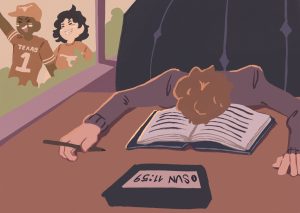UHD should better enforce quiet hours
November 2, 2022
At the end of a long day, residence halls are valuable spaces for students to rest and recharge. Whether students are ready for bed or ready to pull an all-nighter, their residence hall should be a comfortable, calming and quiet environment. Unfortunately, many residents disregard the current quiet hours policy — creating less-than-ideal conditions for others.
To provide students with less disruptive living environments, University Housing and Dining should better enforce its quiet hours policy in residence halls.
The Residence Hall Manual states quiet hours apply to all UHD spaces from 10 p.m. to 9 a.m. UHD also mandates a 24-hour quiet hours policy before and during finals week.
As a resident of Creekside Residence Hall, I’ve experienced repeated violations of this policy, including wild yelling, door slamming and offensively loud music. I’ve even woken up to an electronic keyboard at 6 a.m. on a Monday. And it’s not just Creekside — this problem spans across all residence halls.
Matthew Metta, an undeclared freshman living in Jester East, said quiet hours violations create significant inconveniences.
“On multiple occasions, I can hear people race in the hallway past midnight,” Metta said. “If I was a light sleeper, then I could totally hear them and find that obnoxious.”
Clearly, quiet hours policy violations present several quality-of-life barriers. So why do they persist? In reality, students disturbed by such infractions often hesitate to report them. Many fear pushback or judgment. Thus, the behavior goes largely unaddressed.
JD Castro, assistant director for residence life, described UHD’s enforcement approach.
“We have training for resident assistants before they even start their job on how to address quiet hours policies,” Castro said. “The resident assistant is really just to be the eyes and ears and document for us and our professional staff to be able to manage a situation like that.”
For its part, UHD does warn residents in its manual that quiet hours violators are subject to disciplinary action, ranging from warning emails to in-person meetings with housing conduct administrators.
The policy is well-intentioned on paper, but without proper execution, it carries no weight.
“I don’t think I’ve seen any action being taken,” Metta said. “Maybe there has been, but I haven’t seen it. (The policy) was violated quite a number of times. I think RAs should be more proactive.”
UHD should take substantive steps to educate and discipline quiet hours policy violators. Resident assistants should have the training to address violations independently and immediately rather than simply documenting incidents after the fact. Affected students deserve to have these issues promptly resolved.
Taken together, this strengthened enforcement structure could quickly implement disciplinary action and discourage repeat offenders.
Quiet hours are just that: times of quiet. They allow students to savor the peacefulness of their residence halls and provide breaks from the fast-paced college lifestyle. By better enforcing its quiet hours policy in residence halls, UHD can bolster the standards of living for its student body.
Gokhale is an undeclared business freshman from Allen, Texas.
















